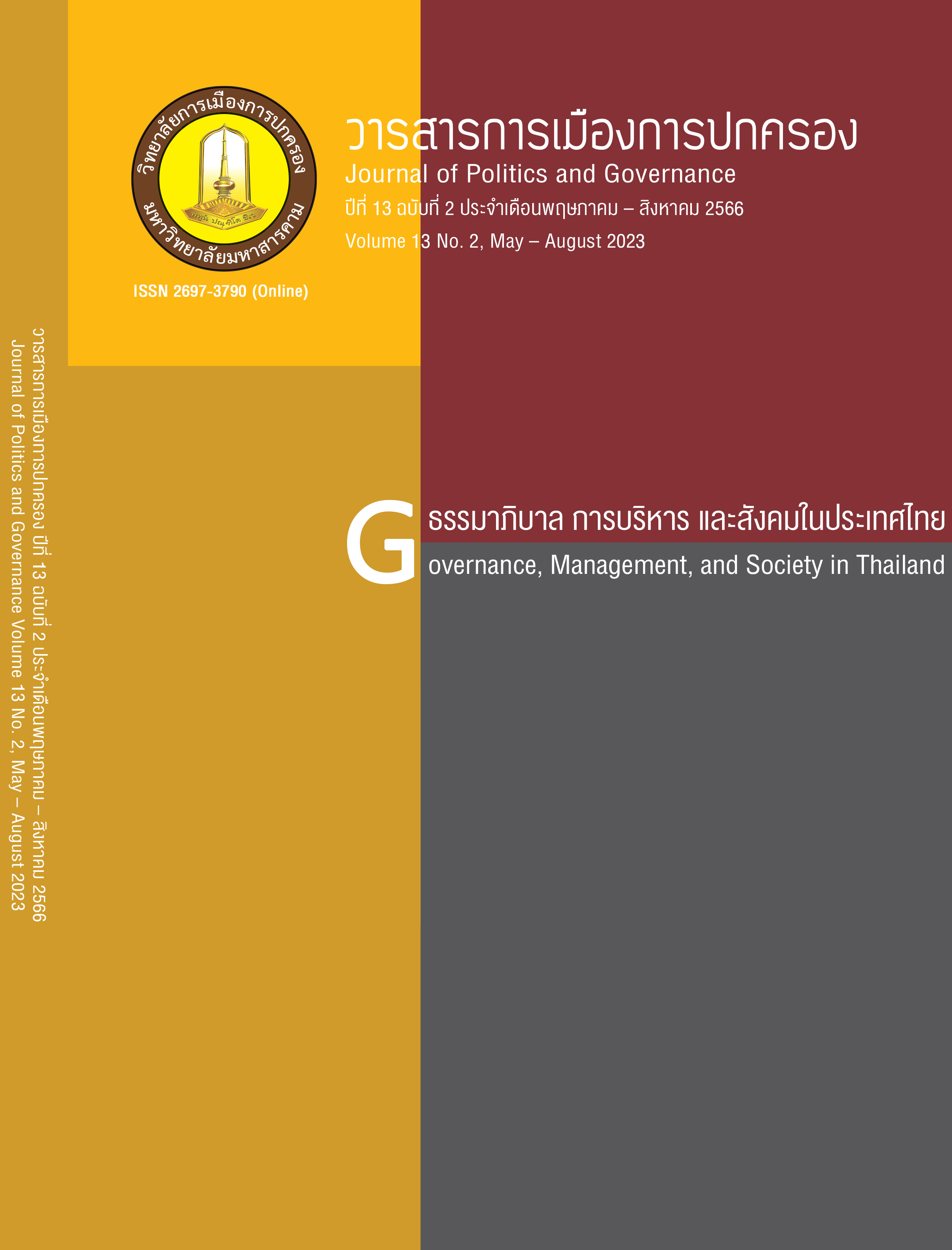A Path Analysis of Factors of Management Influencing Operational Efficiency of the Area Revenue Office under the Responsibility of the Regional Revenue Office 10
Main Article Content
Abstract
This study aimed to investigate operational efficiency and explore direct, indirect, and total effects of causal factors affecting management efficiency of the Area Revenue Office, under jurisdiction of the Regional Revenue Office 10. A quantitative research approach employed closed-ended questionnaires to gather data. The results demonstrated that the Regional Revenue Office 10 had an optimal overall operational efficiency (=4.59, S.D=0.57). In terms of direct effects, coefficient values for the four measured variables, in ascending order, were: man (personnel) (-0.01), message (0.20), management (0.28), and morality (within the organization) (0.39). With respect to indirect effects, coefficient values were shown for three variables, each mediated by the variable of morality. In ascending order, they were: man (-0.02), management (0.15), and message (0.16). Regarding total effects, coefficient values for the four variables, in ascending order, were: man (0.03), message (-0.36), morality (0.39), and management (0.43). Based on the squared multiple correlation (R2), man, management, and message were causal variables accounting for variance in morality. The findings from this study suggest that in order to enhance its operational efficiency, the Regional Revenue Office 10 should take into account three factors, namely, management, message, and morality. Moreover, incorporating measures to account for morality throughout all aspects of operation will improve the organization’s operational efficiency.
Article Details

This work is licensed under a Creative Commons Attribution-NonCommercial-NoDerivatives 4.0 International License.
References
กรมสรรพากร. (2563). ผู้บริหารกรมสรรพากรทั่วประเทศรับทราบนโยบายการบริหารงานจัดเก็บภาษีอากร มุ่งสู่การยกระดับกระบวนการทำงาน เปลี่ยนผ่านสู่ดิจิทัล (DIGITAL TRANSFORMATION) และต่อยอดยุทธศาสตร์ D2RIVE. สืบค้นจาก https://www. rd.go.th/26/686.html.
กรมสรรพากร. (2561). สรรพากรประกาศยุทธศาสตร์ D2RIVE ยกระดับการเก็บภาษีและบริการประชาชนให้ทันสมัย รวดเร็ว และเป็นธรรม สืบค้นจาก. https://www.rd.go.th/fileadmin/user_upload/news/news09_2562_edit.pdf
กรมสรรพากร. (2563). ผลการจัดเก็บภาษี. สืบค้นจาก https://www.rd.go.th/310.html
ณิชานันท์ ปิ่นทอง, อารีรัตน์ ปานศุภวัชร, และวราวุฒิ วรานันตกุล. (2560). ผลกระทบของการสื่อสารภายในองค์กรที่ดีที่มีต่อประสิทธิภาพการดำเนินงานของธุรกิจส่งออกสินค้าเกษตรในประเทศไทย. วารสารการบัญชีและการจัดการ มหาวิทยาลัยมหาสารคาม. 9(2). 39-50.
ทัศมาลี ทองจันทร, และวิชาญ เหรียญวิไลรัตน. (2020). การบริหารแบบมีส่วนร่วมของบุคลากรที่ส่งผลต่อประสิทธิภาพของโรงเรียนกีฬาจังหวัด อุบลราชธานี. วารสารวิชาการ สถาบันวิทยาศาสตร์การจัดการ แห่งแปซิฟิค สาขามนุษยศาสตร์และสังคมศาสตร์, 7(1), 27-42.
ปรีชา สุวรรณภูมิ. (2554). รูปแบบการบริหารจัดการที่มีประสิทธิผลขององค์การบริหารส่วนตำบลในกลุ่มจังหวัดภาคเหนือตอนล่างกลุ่มที่ 1 ประเทศไทย. Journal of the Association of Researchers, 16(3), 102-117.
วิทยา แสนทวีสุข, และทรงศักดิ์ จีระสมบัติ. (2558). การบริหารงานตามหลักธรรมาภิบาลในความคิดเห็นของประชาคมหมู่บ้านขององค์กรบริหารส่วนตำบลกุดฉิม อำเภอธาตุพนม จังหวัดนครพนม (วิทยานิพนธ์ปริญญามหาบัณฑิต). มหาสารคาม, มหาวิทยาลัยราชภัฏมหาสารคาม.
ศุภมาศ วิมลเกียรติ (2564). ตัวแปรที่มีผลต่อประสิทธิภาพการปฏิบัติงานของข้าราชการ สำนักงานสรรพากร พื้นที่ในจังหวัดสมุทรปราการ. วารสารไตรศาสตร์, 7(2), 38-46.
สำนักเลขาธิการคณะรัฐมนตรี. (2560). หนังสือสำนักเลขาธิการคณะรัฐมนตรี ด่วนที่สุด ที่ นร 0505/ว6000. สืบค้นจาก https://www.ocsc.go.th/sites/default/files/attachment/page/w9-2562_atch.pdf.
สุชาติ ประสิทธิ์รัฐสินธุ์. (2550). ระเบียบวิธีวิจัยทางสังคมศาสตร์. กรุงเทพฯ: บริษัท. เฟื่องฟ้า พริ้นติ้ง จำกัด. สุวดีเบญจวงษ์.
อ้อมขวัญ กฤษณะกาฬ, และศรีสุนันท์ ประเสริฐสังข์. (2562). ระบบการบริหารงานที่มีประสิทธิภาพสูงที่ส่งผลต่อประสิทธิภาพการทำงานของบุคลากร สายสนับสนุนมหาวิทยาลัยราชภัฏร้อยเอ็ด. วารสารวิชาการแพรวากาฬสิธุ์, 6(2), 268-289.
Ayuso, S., Rodríguez, M. A., García-Castro, R., & Ariño, M. A. (2014). Maximizing stakeholders’ interests: An empirical analysis of the stakeholder approach to corporate governance. Business & Society, 53(3), 414-439.
Diamantidis, A. D., & Chatzoglou, P. (2019). Factors affecting employee performance: an empirical approach. International Journal of Productivity and Performance Management, 68(1), 171-193
Hair J. F., Black W. C., Babin B. J., Anderson R. E. & Tatham R. L. (2006). Multivariate data analysis (6th ed.). Pearson Prentice Hall: New Jersey.
Insani, N. (2020). Apparatus Professionalism and Public Service Ethics. Journal La Sociale, 1(1), 25-28.
Jangsuthivorawat, K., Pinthapataya, S., & Boonyasopon, T. (2018). Development Model of Knowledge Management System Enhancing the Organization Efficiency of the Hard Disk Drive Industry. Journal of King Mongkut's University of Technology North Bangkok, 28(2), 453-460.
Lebedev, K. A. E., Reznikova, O. S., Dimitrieva, S. D., & Ametova, E. I. (2018). Methodological Approaches to Assessing the Efficiency of Personnel Management in Companies. Journal of Advanced Research in Law and Economics, 9(4), 1331-1336
Lora-Guzmán, H. S., Castilla-Paternina, S., & Góez-Flórez, M. (2020). Management by Competencies as a Strategy for the Improvement of Efficiency and Organizational Effectiveness. Universidad Libre, 15(1), 83–94.
Menzel, D. C. (2019). Ethics Management in Public Organizations: What, Why, and How?. In Handbook of administrative ethics (pp. 355-366). New York: Routledge.
Olkiewicz, M. (2018). Quality improvement through foresight methodology as a direction to increase the effectiveness of an organization. Contemporary Economics, 12(1), 69-81.
Rostek, K., & Młodzianowski, D. (2018). The impact of conscious and organized change management on efficiency of functioning the network organization. Management and Production Engineering Review, 9(3), 49-58.
Steen, M., & Nauta, J. (2020). Advantages and disadvantages of societal engagement: a case study in a research and technology organization. Journal of Responsible Innovation, 7(3), 598-619.
Stojanovic, M. (2019). Conceptualization of ecological management: practice, frameworks and philosophy. Journal of Agricultural and Environmental Ethics, 32(3), 431-446.
Van, V. H., Phong, N. X., & Hiep, H. D. (2019). Basic issues about organization and apparatus of the current political system in Vietnam. International Journal of Advance Research, Ideas and Innovations in Technology, 5(6), 160-167.
Vasu, M. L., Stewart, D. W., & Garson, G. D. (2017). Organizational behavior and public management. New York: Routledge.
Vincent and Charles. (1973). Why employees stay, Building resilience and sustainability in Asia-Pacific Supply Chains. Harvard business review.
Zille, H., Ishibuchi, H., Mostaghim, S., & Nojima, Y. (2017). A framework for large-scale multi objective optimization based on problem transformation. IEEE Transactions on Evolutionary Computation, 22(2), 260-275.


